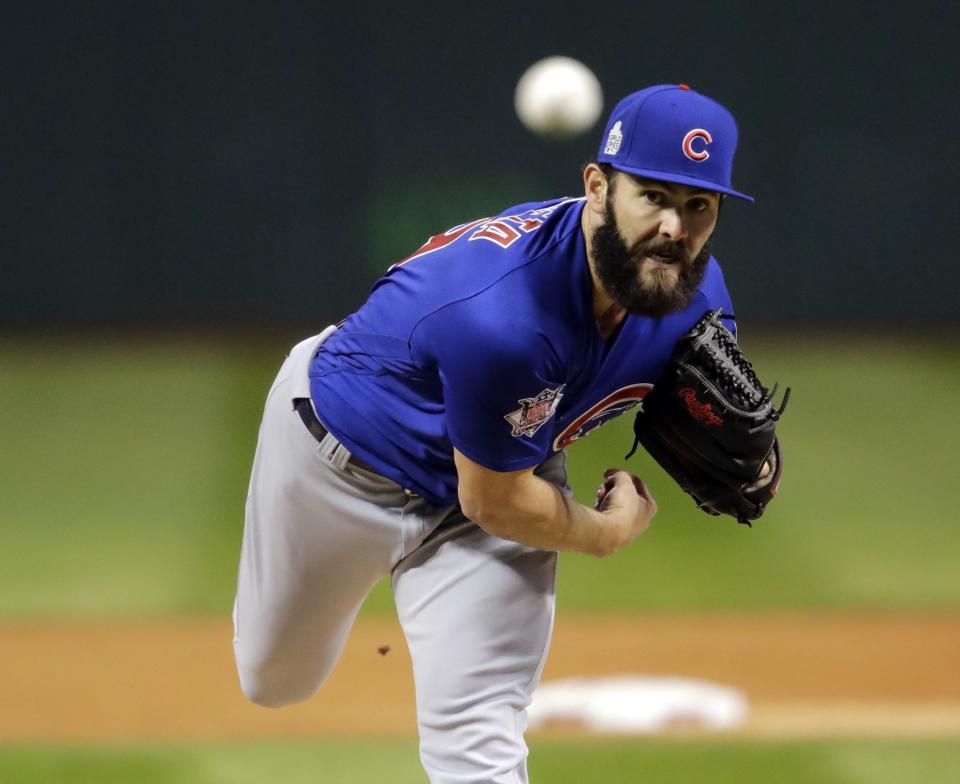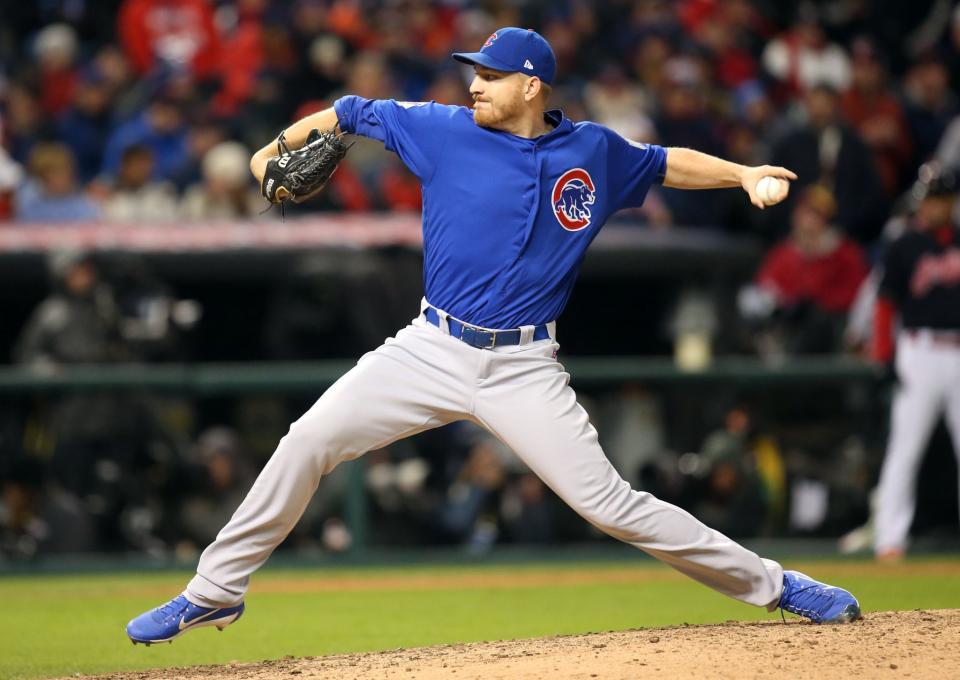World Series Game 2: The bridge between Jake Arrieta and Aroldis Chapman
CLEVELAND – Beyond the right center-field wall here, they keep the relievers and a couple catchers and a coach or two, enough baseballs to go around, a few things to snack on and a bucket to drink from, and on a night like Wednesday, there’s heat. So they all huddle on the bench, warm and waiting, out from the cold and the coming storm, away for the moment from whatever’s going on in front of them.
That’s where Mike Montgomery was. He’s a left-hander. He came over from Seattle to Chicago in late July. The Cubs liked him because he could be a starter or a reliever, and the name of the game anymore does seem to lean toward utility. He also was what they call a “spin-rate” guy, in this case meaning his curveball can do things other guys’ can’t, which is pretty sporty, as well, when the fastball can run into the mid-90s.
Like everyone at Progressive Field, Montgomery was watching Jake Arrieta, whose start against the Cleveland Indians in a 5-1 Game 2 World Series win had become curious for the fact he was throwing a lot of pitches and also for the fact it was the sixth inning and none of those pitches had yet been struck for a hit. So there was some moving around in the bullpen for the sake of the pitch count and nothing too overt in deference to the no-hitter. And, besides, the Cubs were way ahead, and Arrieta tends toward being a beast, and also out there on the bullpen mounds it was cold.

Maybe Arrieta was going to get the Cubs all the way to Aroldis Chapman, if he trended toward economical, but maybe not, and it was the latter possibility that could decide whether the Cubs fly through the coming storm even in the series or down, two games to none. The middle of the game is where Montgomery works, so when the phone rang he’d already edged out a few inches on that bench and waggled his left arm to let it know it’s almost time.
“We knew that coming in,” Montgomery said, “that this potentially would be a high pitch-count game. This time of year, hitters take good at-bats, they don’t swing a lot outside the zone. That leads to higher pitch counts, so we expect games to be like that.”
Jason Kipnis doubled with one out in the sixth, on Arrieta’s 87th pitch. Francisco Lindor grounded out. Arrieta’s second pitch to Mike Napoli he threw to the backstop, Kipnis scored. Montgomery, by then, had stepped away from the bench into the cold. He threw maybe eight warm-up pitches. Napoli laced a single to left. Somebody – maybe a few somebodies – was going to need to cover six or seven outs, get to Chapman, hold what was then a 5-1 lead, get everybody to Chicago safe and sound and warm.
“I kind of warmed up quick,” Montgomery, who’d be that somebody, said. “I didn’t have much time.”
The fastball command wasn’t quite there. The curveball was coming a little easier. And Joe Maddon, the Cubs manager, was at the first-base foul line, holding up his gloved left hand, so Montgomery would get Indians switch-hitter Jose Ramirez to finish the sixth and everybody would sort out the rest from there.
“Hey, I’m loose,” Montgomery said he thought to himself. “I’ll find it when I get out there.”
After the rush to get it started on account of the green goo of rain and wind and who knows what else approaching from the west, after they’d pulled up the tarp and mopped the outfield and hurried everybody through the gates, the baseball game here became a slog of inexact pitches and tenuous foot and glove work anyway, a very chaotic experience if you’re given to the tremors.
But, along went Arrieta, along went the Cubs, along went Maddon, dressed in a knit cap that bowed around the frames of his glasses and had a little spongy ball on top and winter gloves he blew into often. Along they went, undeterred by the cold or the interminable pace or the coming precipitation, which probably was going to be sleet or hail or whole ice trays or something given how folks were talking about it.
Arrieta worked in short sleeves and an unblinking stare, as though it were August in Chicago. Javy Baez, a teammate from Puerto Rico, wore a ski mask and looked like he would’ve accepted a parka and ski pants if offered.
Who’s to say why Indians pitchers could not locate Chris Guccione’s strike zone, starting with Trevor Bauer and continuing about every time anybody opened the bullpen gate? The chill. The calm and finicky Cubs hitters, the same group that forced 46 pitches out of Andrew Miller the night before. One of those nights, you know, when the baseball simply would not cooperate, so by the end of the fifth inning three Indians had thrown 133 pitches, which meant every time a Cubs batter did anything of substance one or two other Cubs might’ve scored.

There is no pattern, no roll, no momentum, there are only baseball games, this one played as if under a strobe light, herky-jerky, start here, end there, dark and weird in between.
Montgomery, admittedly amped in his first World Series game and thrust into the fray, threw a curveball to Ramirez for strike one. Spin-rate, baby. He threw another. Ramirez touched the top of the ball, pushed it straight back to Montgomery, who turned and whipped the third out of the sixth to first base. He pitched a scoreless seventh inning, striking out three Indians around a hit and a walk. He got the first two outs of the eighth, then allowed a single to Napoli, and turned to see Maddon coming.
He’d taken care of six outs, every one of them between Arrieta and Chapman. Those two innings weren’t perfect, but they were scoreless, damned close enough to perfect, and nobody is asking how this time of year. Not how you did it. Not how warm it was. Not how pretty it could’ve been. Not how the spin rate looks. And certainly not how many times you’ve done it before.
Just, here’s the ball. Come into the cold. Get a few outs. Get them all to Game 3.
Mike Montgomery smiled later.
“Felt good,” he said. “Felt good.”


